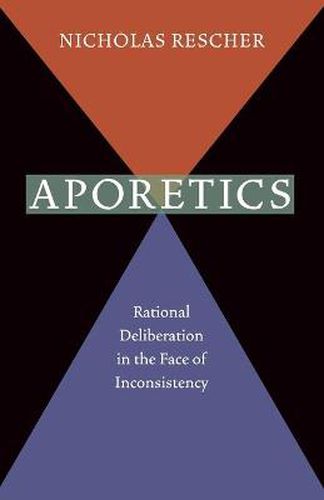Readings Newsletter
Become a Readings Member to make your shopping experience even easier.
Sign in or sign up for free!
You’re not far away from qualifying for FREE standard shipping within Australia
You’ve qualified for FREE standard shipping within Australia
The cart is loading…






The word apory stems from the Greek aporia, meaning impasse or perplexing difficulty. In Aporetics, Nicholas Rescher defines an apory as a group of individually plausible but collectively incompatible theses. Rescher examines historic, formulaic, and systematic apories and couples these with aporetic theory from other authors to form this original and comprehensive survey. Citing thinkers from the pre-Socratics through Spinoza, Hegel, and Nicolai Hartmann, he builds a framework for coping with the complexities of divergent theses, and shows in detail how aporetic analysis can be applied to a variety of fields including philosophy, mathematics, linguistics, logic, and intellectual history.
Rescher’s in-depth examination reveals how aporetic inconsistency can be managed through a plausibility analysis that breaks the chain of inconsistency at its weakest link by deploying right-of-way precedence based on considerations of cognitive centrality. Thus while involvement with cognitive conflicts and inconsistencies are pervasive in human thought, aporetic analysis can provide an effective means of damage control.
$9.00 standard shipping within Australia
FREE standard shipping within Australia for orders over $100.00
Express & International shipping calculated at checkout
The word apory stems from the Greek aporia, meaning impasse or perplexing difficulty. In Aporetics, Nicholas Rescher defines an apory as a group of individually plausible but collectively incompatible theses. Rescher examines historic, formulaic, and systematic apories and couples these with aporetic theory from other authors to form this original and comprehensive survey. Citing thinkers from the pre-Socratics through Spinoza, Hegel, and Nicolai Hartmann, he builds a framework for coping with the complexities of divergent theses, and shows in detail how aporetic analysis can be applied to a variety of fields including philosophy, mathematics, linguistics, logic, and intellectual history.
Rescher’s in-depth examination reveals how aporetic inconsistency can be managed through a plausibility analysis that breaks the chain of inconsistency at its weakest link by deploying right-of-way precedence based on considerations of cognitive centrality. Thus while involvement with cognitive conflicts and inconsistencies are pervasive in human thought, aporetic analysis can provide an effective means of damage control.